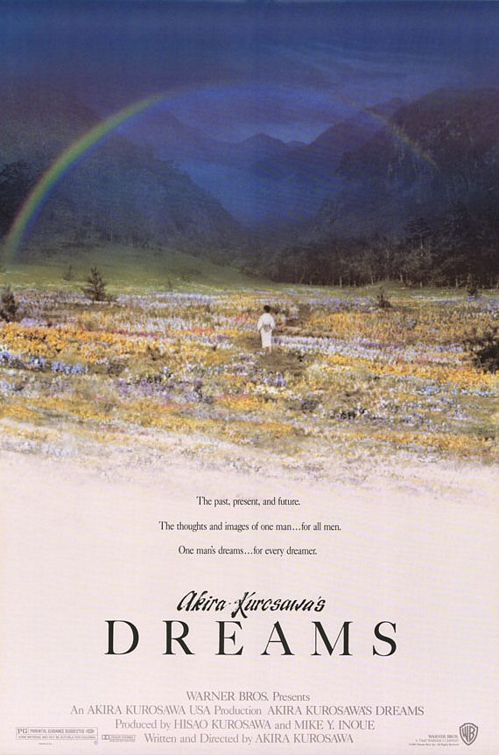Directed by: Akira Kurosawa
"Hey, would you hear about the dreams that i had last night?".
If one was asked with that question, the response would be mostly winched and counting the clock or immediately wished to be somewhere else or doing something else. Well, that's not the case when we seen the "Dreams" by Akira Kurosawa.
Composed with eight unrelated short-story, "Dreams" is a voyage to the wonderful imageries, a dream's materialization from Akira Kurosawa's personal dreams that somehow reflected his opinions toward things especially humanity as we often has seen in his previos movies. Dreams that in the unconsciousness level also become dreams to anyone else.
Some say that "Dreams" was over-done and over-rated. Some even say that at the time when Kurosawa is at the dusk of his career had surely lost his touch, the "Dreams" was also lose his usual touch of charms.
But as for me, "Dreams" was as beatufiul as ever. The eight episodes fore-mentioned was clearly stated Kurosawa's conscious mind toward things he love the most, nature. His griveous fear of the outcome of war, and nuclear-power. His view of the inevitability of death. All portrayed in magnificent sometimes surrealistic view with fantastic color that dragged me to the so-called "Fantasia".
The first two-episodes, "Sunshine through the rain" and "The peach orchard" told about the urban legend related to the fox -- the most feared beast-demon in Japan -- and the Doll celebration which had to be arranged in a certain strict rule. Of these two episodes, i was astonished with the color tone he uses. I was quickly absorbed in his world, in his utopia, in his fantasy, with such magnificent view of nature. And we also get to see, the traditional Japanese-dancers and cloths. Very astonishing.
The next two-episodes told about death. "The Blizzard" told about the weary mountain climbers in a midst of snowstorm. The weariness ultimately became unbearable as many of the team members decided to stop lest the group leader keep yelling them to keep moving, since he knew that once they halt to a stop, a certain death would embraced them. When suddenly the leader has also became weary and already in the verge of death, there came a siren encouraging him to stay on. "Yuki wa atatakai", the snow is warm she said. It was a damn cold episode.
"The Tunnel" was the most frightening episode in the "Dreams" and ultimately also became my personal favourite. It told about the military commander who was on his way home thorugh dark hollow tunnel when -- menacingly frightening -- he heard the footsteps that follows. And in the end he had to explain to the third batalyon, the ones who followed him that they're already dead and can't walk with him through the tunnel. He also asks for their forgiveness for being the only one alive. Very touching when he gave the batalyon his last regards.
I didn't like the next episode that follows, "Crows" so i think that i just going to skipped it. It told about a young art student who literally walks through Van Gogh's painting and meet with the artist himself (played by Martin Scorcese) and visually amazing the young student followed Van Gogh by literally walking from his painting to another.
The next two episodes told about his fear in nuclear power, and the outcome of war. "Mt. Fuji in red" portrayed the nuclear-plaint explotion that rendered Mt.Fuji as if the mountain has erupted and engulfed in the bright scarlet color. The message of this episode, which is the danger and the fear of nuclear power was delivered successfully in a most horrific-shots and final sequence that leaves the conclusion of certain death left untold. While "The Weeping Demon" literally brings hell on earth as Kurosawa portrayed the worst possible outcome of war. These two episodes can be regarded as the darkest episodes in the "Dreams", it is tragic, it is horrific, and it is -- of course -- dark.
But the final episode was quickly lift the mood after being stormed by two dark episodes forementioned. "Village in Watermills" told about one hiker ("I" which i then learnt that he was the alter-ego of Kurosawa) who stumbled upon the village which seems so distant from a certain monster called Civilization. While he sat and talks to the elderly man about living in such calm village, we sought the beauty of nature and as for myself, longingly wanted, and missed those kind of lives. This is a great slow-paced peaceful episode that wrapped the "Dreams". A series of Kurosawa's experiment in the dusk of his career of more than 50 years directing movies.

Rating: ***1/2 / **** - I would give the four rating to this movie if Martin Scorcese doesn't play the English speaking Vincent Van Gogh.